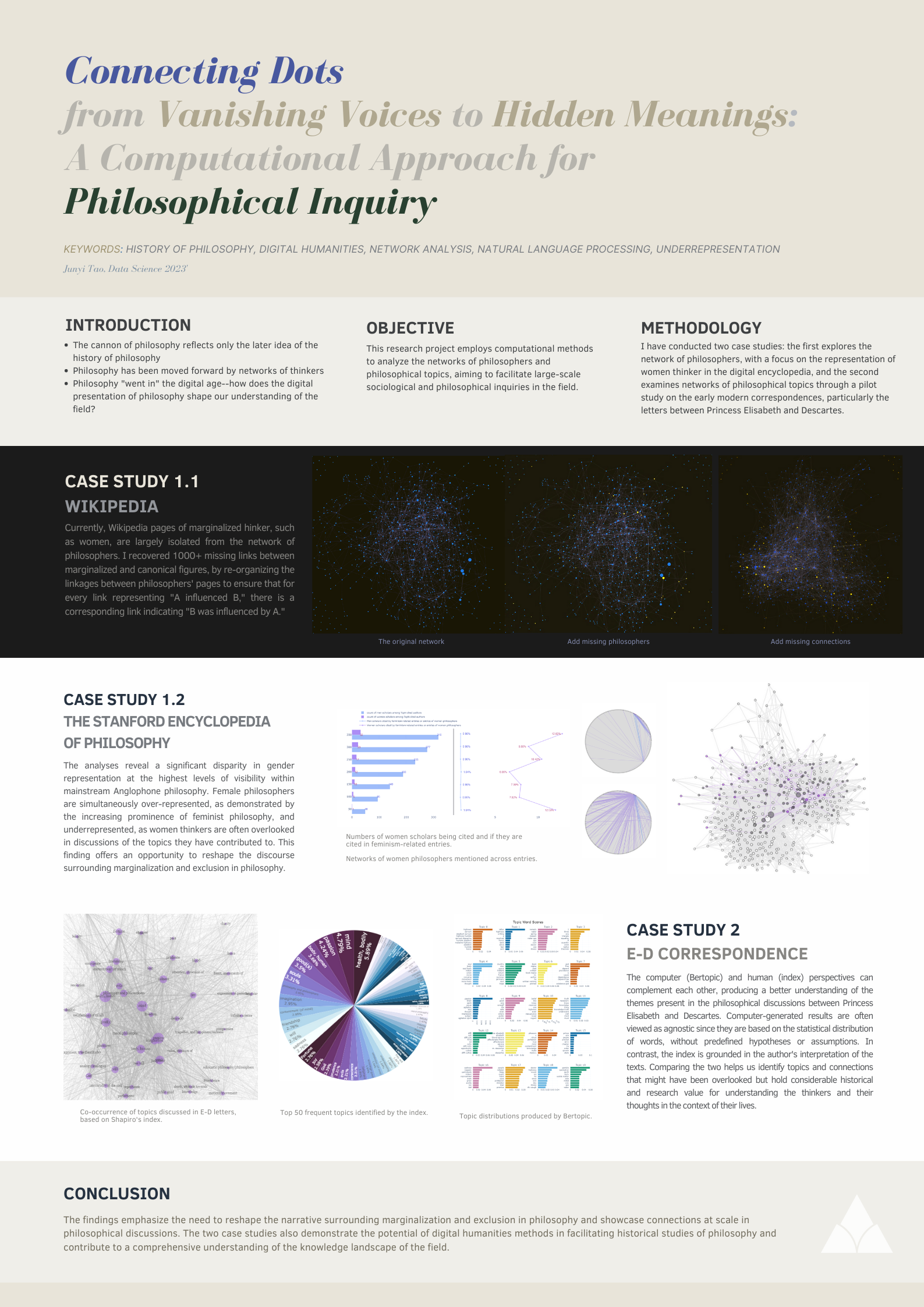Three Layers of the Knowledge Landscape: A Case Study on the Stanford Encyclopedia of Philosophy
This project went through two iterations: it starts from a senior thesis project during my undergraduate study at Duke University and Duke Kunshan University, and extends to a Digital Humanities Research Fellowship project at Stanford University, supported by the Center for Spatial and Textual Analysis (CESTA).
Presentation slides: available here
Junyi Tao (MS Student in Symbolic Systems): “Three Layers of the Knowledge Landscape: A Case Study on the Stanford Encyclopedia of Philosophy” 2024 DH Research Showcase: link
This project takes a deeper look into the widely influential Stanford Encyclopedia of Philosophy (SEP) and reveals three layers of the philosophy landscape it presents. The first layer is the content of entries, each offering an overview of a philosophical topic or thinker. Beneath this lies a layer of citations that manifest the dialogues among scholars within the community. From this, we start to see more clearly how social power is intertwined with the narrative of intellectual history—for example, whose voices count? The last one is the layer of meta-content assigned by the SEP’s authors and editors, such as links between related entries, which shapes the architecture of this “knowledge system”. At the end of this talk, I would also like to share some methodological reflections.
Overview of the project: How the argument is laid out:
Want to see more?Presentation slides are available here
Below is the original project description when I was in undergrad
This is a team-based signature work (senior thesis) project, with Karen Nielsen, a philosophy major at Duke University andDuke Kunshan University.
Awarded with Graduation with Distinction for outstanding academic performance and the excellence of Signature Work (Senior Thesis). May 26th, 2023. By Duke Kunshan University. Presentation
Signature Work (Senior Thesis) presentation poster
My signature work project explores an integrated approach that combines data science and humanistic inquiries to discover patterns beyond close reading and ground this analysis in social and historical contexts. Using network science and natural language processing methods, I have conducted several case studies to investigate the connections between philosophers and ideas at scale, focusing on the representation of women philosophers in online encyclopedias such as Wikipedia and the Stanford Encyclopedia of Philosophy.
This study reveals that women philosophers are simultaneously overrepresented, as demonstrated by the increasing prominence of feminist philosophy, and underrepresented, as women thinkers are often overlooked in discussions of the topics they have contributed to. This finding offers an opportunity to reshape the discourse surrounding marginalization and exclusion in philosophy and the narrative of intellectual history.
Although some may argue that the recognition of philosophers on the SEP ultimately depends on their influence and the difficulty of rediscovering their sources, we maintain that it is crucial for influential platforms like the SEP to strive for increased representation of historically marginalized groups. Given its influence among both non-academic and professional audiences, the SEP can significantly contribute to promoting diversity in the field.
The findings highlight the potential to reshape the narrative surrounding marginalization and exclusion in philosophy and showcase connections at scale in philosophical discussions. The two case studies also demonstrate the potential of digital humanities methods in facilitating historical studies of philosophy and contribute to a comprehensive understanding of the knowledge landscape of the field.
Some of the visualizations and findings of the SEP:
Visualization of the isolation of women philosophers on Wikipedia
A presentation at Superdeep, a philosophy seminar at Duke Kunshan University: https://sites.duke.edu/dkuhumanities/superdeep-18-nielsen-tao/









